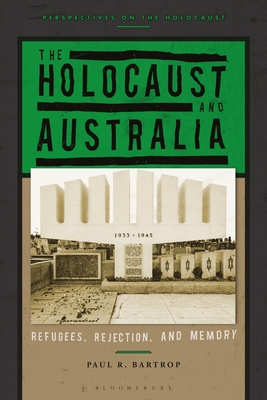The Holocaust and Australia: Refugees, Rejection, and Memory

The Holocaust and Australia: Refugees, Rejection, and Memory
Paul R. Bartrop examines the formation and execution of Australian government policy towards European Jews during the Holocaust period, revealing that Australia did not have an established refugee policy (as opposed to an immigration policy) until late 1938. He shows that, following the Evian Conference of July 1938, Interior Minister John McEwen pledged a new policy of accepting 15,000 refugees (not specifically Jewish), but the bureaucracy cynically sought to restrict Jewish entry despite McEwen's lofty ambitions. Moreover, the book considers the (largely negative) popular attitudes toward Jewish immigrants in Australia, looking at how these views were manifested in the press and in letters to the Department of the Interior.
The Holocaust and Australia grapples with how, when the Second World War broke out, questions of security were exploited as the means to further exclude Jewish refugees, a policy incongruous alongside government pronouncements condemning Nazi atrocities. The book also reflects on the double standard applied towards refugees who were Jewish and those who were not, as shown through the refusal of the government to accept 90% of Jewish applications before the war. During the war years this double standard continued, as Australia said it was not accepting foreign immigrants while taking in those it deemed to be acceptable for the war effort. Incorporating the voices of the Holocaust refugees themselves and placing the country's response in the wider contexts of both national and international history in the decades that have followed, Paul R. Bartrop provides a peerless Australian perspective on one of the most catastrophic episodes in world history.PRP: 167.92 Lei
Acesta este Prețul Recomandat de Producător. Prețul de vânzare al produsului este afișat mai jos.
151.13Lei
151.13Lei
167.92 LeiIndisponibil
Descrierea produsului
Paul R. Bartrop examines the formation and execution of Australian government policy towards European Jews during the Holocaust period, revealing that Australia did not have an established refugee policy (as opposed to an immigration policy) until late 1938. He shows that, following the Evian Conference of July 1938, Interior Minister John McEwen pledged a new policy of accepting 15,000 refugees (not specifically Jewish), but the bureaucracy cynically sought to restrict Jewish entry despite McEwen's lofty ambitions. Moreover, the book considers the (largely negative) popular attitudes toward Jewish immigrants in Australia, looking at how these views were manifested in the press and in letters to the Department of the Interior.
The Holocaust and Australia grapples with how, when the Second World War broke out, questions of security were exploited as the means to further exclude Jewish refugees, a policy incongruous alongside government pronouncements condemning Nazi atrocities. The book also reflects on the double standard applied towards refugees who were Jewish and those who were not, as shown through the refusal of the government to accept 90% of Jewish applications before the war. During the war years this double standard continued, as Australia said it was not accepting foreign immigrants while taking in those it deemed to be acceptable for the war effort. Incorporating the voices of the Holocaust refugees themselves and placing the country's response in the wider contexts of both national and international history in the decades that have followed, Paul R. Bartrop provides a peerless Australian perspective on one of the most catastrophic episodes in world history.Detaliile produsului










